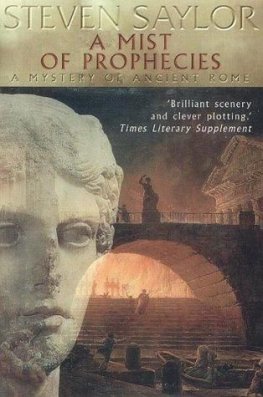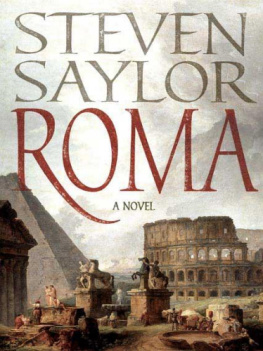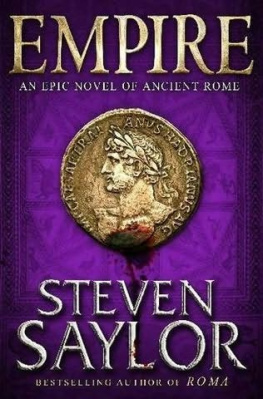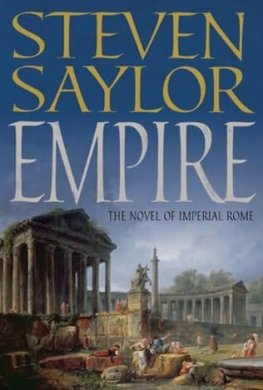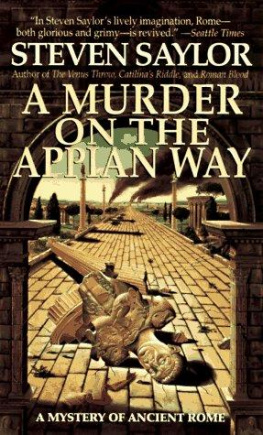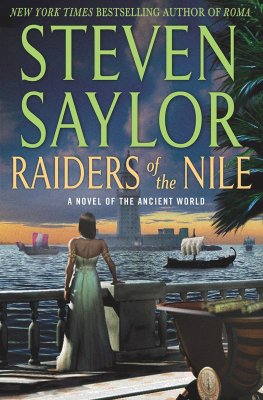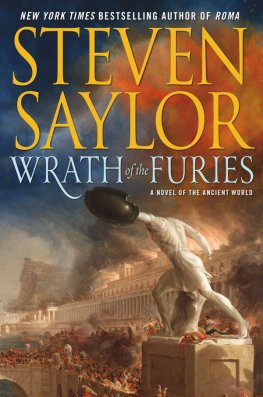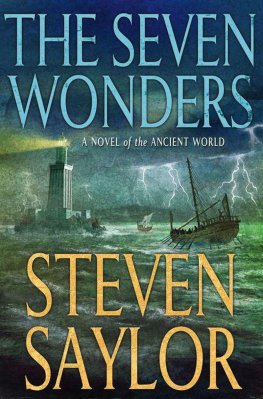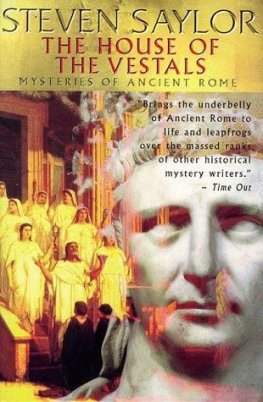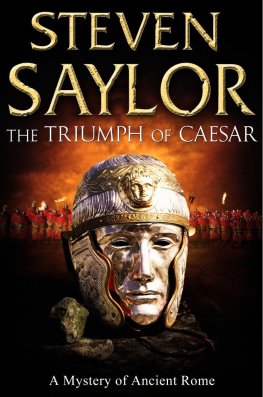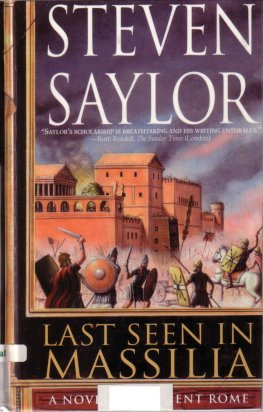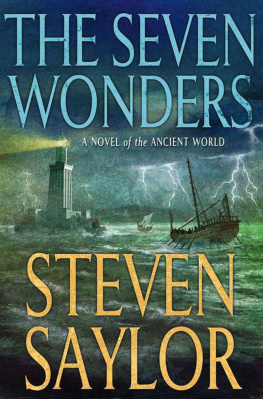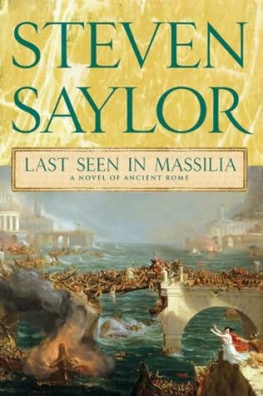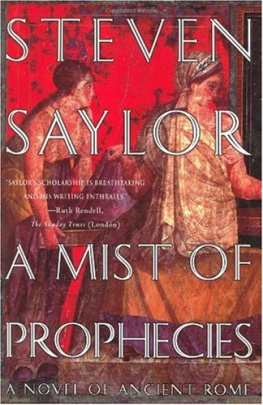Steven Saylor - A Mist of Prophecies
Here you can read online Steven Saylor - A Mist of Prophecies full text of the book (entire story) in english for free. Download pdf and epub, get meaning, cover and reviews about this ebook. genre: Detective and thriller. Description of the work, (preface) as well as reviews are available. Best literature library LitArk.com created for fans of good reading and offers a wide selection of genres:
Romance novel
Science fiction
Adventure
Detective
Science
History
Home and family
Prose
Art
Politics
Computer
Non-fiction
Religion
Business
Children
Humor
Choose a favorite category and find really read worthwhile books. Enjoy immersion in the world of imagination, feel the emotions of the characters or learn something new for yourself, make an fascinating discovery.
- Book:A Mist of Prophecies
- Author:
- Genre:
- Rating:5 / 5
- Favourites:Add to favourites
- Your mark:
- 100
- 1
- 2
- 3
- 4
- 5
A Mist of Prophecies: summary, description and annotation
We offer to read an annotation, description, summary or preface (depends on what the author of the book "A Mist of Prophecies" wrote himself). If you haven't found the necessary information about the book — write in the comments, we will try to find it.
A Mist of Prophecies — read online for free the complete book (whole text) full work
Below is the text of the book, divided by pages. System saving the place of the last page read, allows you to conveniently read the book "A Mist of Prophecies" online for free, without having to search again every time where you left off. Put a bookmark, and you can go to the page where you finished reading at any time.
Font size:
Interval:
Bookmark:
Steven Saylor
A Mist of Prophecies
Chronology
THE STORY OPENS ON 9 AUGUST 48 B.C. SOME DATES CITED BELOW ARE CONJECTURAL. THE ENTRIES THAT MENTION CASSANDRA ARE FICTIONAL.
82-80
Sulla rules Rome as dictator.
73
The Vestal Fabia is tried for breaking her vow of chastity with Catilina. Spartacus begins the great slave revolt, suppressed the next year.
63
Cicero serves as consul; he suppresses Catilina's conspiracy.
56
April: Marcus Caelius is tried for murder with Cicero defending; Clodia is behind the prosecution.
55
18 November: Milo and Fausta are married.
52
18 January: Clodius is murdered.
April: Milo is tried for the murder of Clodius with Cicero defending, Marc Antony prosecuting; he is convicted and flees to Massilia.
49
11 or 10 January: Caesar crosses the Rubicon.
17 March: Pompey flees across the Adriatic Sea to Greece.
19 May: Cicero's daughter, Tullia, gives birth to a baby, who dies shortly thereafter.
7 June: Cicero leaves Italy to join Pompey in Greece.
2 August: Pompey's forces in Spain surrender to Caesar.
October: Massilia surrenders to Caesar, who pardons all the Roman exiles there except Milo. Caesar returns to Rome to accept the dictatorship for eleven days, expressly to conduct elections; Caelius elected praetor.
November: News of Curio's death in Africa reaches Caesar in Rome.
48
5 January: Caesar crosses the Adriatic Sea.
Late February: Caelius erects his tribunal next to Trebonius and sets off a riot.
Late March: Antony crosses the Adriatic Sea to join Caesar. Caelius sets off a second riot.
April: Pompey and Caesar begin military operations at Dyrrachium. The Senate invokes the Ultimate Decree against Caelius. Milo escapes from Massilia to return to Italy.
17 July: Pompey nearly overruns Caesar's forces at Dyrrachium. Caesar decides to withdraw. The theater of battle moves inland to Thessaly.
5 August (the Nones of Sextilis): Cassandra is murdered.9 August: Cassandra is buried. Caesar and Pompey engage in battle near the town of Pharsalus in Thessaly.
Cassandra:
Apollo, Apollo!
Lord of the ways, my ruin
You have undone me once again, and utterly.
Chorus:
After the darkness of her speech
I go bewildered in a mist of prophecies.
- Aeschylus, Agamemnon 1080-82; 1112-13I
The last time I saw Cassandra
I was about to say: the last time I saw Cassandra was on the day of her death. But that would be untrue. The last time I saw her-gazed upon her face, ran my fingers over her golden hair, dared to touch her cold cheek-was on her funeral day.
It was I who made all the arrangements. There was no one else to do it. No one else came forward to claim her body.
I call her Cassandra, but that was not her real name, of course. No parents would ever give a child such an accursed name, any more than they would name a baby Medea or Medusa or Cyclops. Nor would any master give such an ill-omened name to a slave. Others called her Cassandra because of the special gift they believed her to possess. Like the original Cassandra, the doomed princess of ancient Troy, it seemed that our Cassandra could foretell the future. Little good that accursed gift did either of the women who bore that name.
She called herself what others called her, Cassandra, saying she could no longer remember her real name or who her parents were or where she came from. Some thought the gods had given her glimpses of the future to compensate for robbing her of the past.
Someone else robbed her of the present. Someone snuffed out the flame that burned inside her and lit her with an inner glow such as I have seen in no other mortal. Someone murdered Cassandra.
As I said, it fell to me to make the funeral arrangements. No outraged friend or lover, no grieving parent or sibling came forward to claim her. The young man who had been her sole companion, the mute she called Rupa-bodyguard, servant, relative, lover?-vanished when she was murdered.
For three days her body rested on a bier in the foyer of my house on the Palatine Hill. The embalmers clothed her in white and surrounded her with pine branches to scent the air. Her killer had done nothing to destroy Cassandra's beauty; it was poison that killed her. Drained of color, Cassandra's smooth cheeks and tender lips took on a waxen, opalescent quality, as if she were carved from translucent white marble. The hair that framed her face looked like hammered gold, cold and hard to the touch.
By day, illuminated by sunbeams that poured through the atrium skylight, she looked no more alive than a white marble statue. But each night, while the rest of the household slept, I stole from my wife's bed and crept to the foyer to gaze at Cassandra's body. There were times-strange moments such as occur only in the middle of the night, when the mind is weary and flickering lamplight plays tricks on an old man's eyes-when it seemed hardly possible that the body on the bier could be truly dead. The lamplight infused Cassandra's face with a warm glow. Her hair shimmered with highlights of red and yellow. It seemed that at any moment she might open her eyes and part her lips to draw a quickening breath. Once I even dared to touch my lips to hers, but I drew back with a shudder, for they were as cold and unresponsive as the lips of a statue.
I placed a black wreath on my door. Such wreaths are a warning in one sense, alerting others to the presence of death in the household, but in another sense they issue an invitation: come, pay your final respects. But not a single visitor came to view Cassandra's body. Not even one of those compulsive gossips came to pester us, the type who make the rounds of the city looking for wreaths and knocking on doors of people they've never met, just to have a look at the latest corpse so they can deliver an opinion on the embalmers' handiwork. I alone mourned Cassandra.
Perhaps, I thought, death and funerals had become too commonplace in Rome for the passing of a single woman of unknown family, commonly thought to be as mad as-well, as mad as Cassandra-to excite any interest. The whole world was swept up in a civil war that dwarfed all other conflicts in the history of the world. Warriors were dying by the hundreds and thousands on land and on sea. Despairing wives were wasting into oblivion. Ruined debtors were found hanging from rafters. Greedy speculators were stabbed in their sleep. All was ruin, and the future promised only more death and suffering on a scale never known before by human kind. Beautiful Cassandra, who'd haunted the streets of Rome uttering shrill, crazy prophecies, was dead-and no one cared enough to come and see her body.
And yet, someone had cared enough to murder her.
When the period of mourning was done, I summoned the strongest of my household slaves to lift the bier onto their shoulders. The members of my household formed the funeral cortege, except for my wife, Bethesda, who had been ill for quite some time and was not well enough to go out that day. In her place my daughter, Diana, walked beside me, and beside her walked her husband, Davus. Behind us walked my son Eco and his wife, Menenia, and their golden-headed twins, now old enough, at eleven, to understand the somber nature of the occasion. Hieronymus the Massilian, who had been residing in my house since his arrival in Rome the previous year, also came; he had suffered much in his life and had known the pain of being outcast, so I think he felt a natural bond of sympathy with Cassandra. My household slaves, few in number, followed, among them the brothers Androcles and Mopsus, who were not quite as old as Eco's children. For once, sensing the gravity of the occasion, they behaved themselves.
Font size:
Interval:
Bookmark:
Similar books «A Mist of Prophecies»
Look at similar books to A Mist of Prophecies. We have selected literature similar in name and meaning in the hope of providing readers with more options to find new, interesting, not yet read works.
Discussion, reviews of the book A Mist of Prophecies and just readers' own opinions. Leave your comments, write what you think about the work, its meaning or the main characters. Specify what exactly you liked and what you didn't like, and why you think so.

